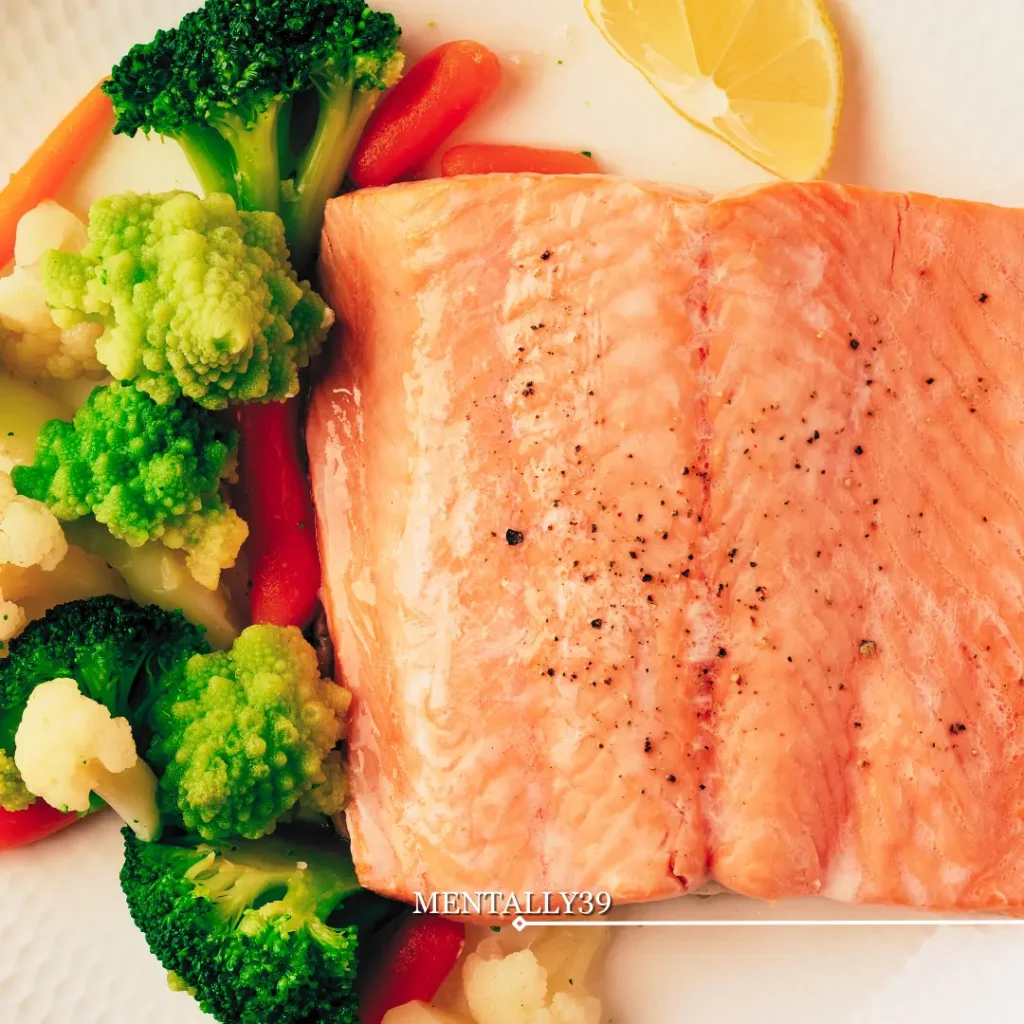It is surprising to learn that almost 60% of Americans suffer from at least one chronic inflammatory condition, which contributes to many of today’s most common diseases. This alarming statistic highlights the serious impact of chronic inflammation on our health. However, there is good news – incorporating the best anti-inflammatory foods into your diet can reduce inflammation and protect yourself from its harmful effects. The health benefits of an anti-inflammatory diet rich in antioxidants and inflammation-fighting foods are not just a fad but a delicious and nurturing way to strengthen your body’s defenses and prioritize your well-being.
Eating foods that fight inflammation can have numerous health benefits. Each meal provides an opportunity to nourish and heal our bodies. Foods like berries, leafy greens, and omega-3-rich fish can reduce the risk of inflammation. It’s important to focus on both adding healthy foods and removing unhealthy ones. This will ensure that each bite counts towards reducing the levels of inflammation.
Key Takeaways:
- We need to manage our diet in order to prevent several illnesses that are caused by inflammation. I
- An anti-inflammatory diet is filled with antioxidants and nutrients that help reduce inflammation and promote overall well-being.
- Incorporating a variety of fruits, vegetables, whole grains, and lean proteins can provide significant anti-inflammatory benefits.
- Foods with natural antioxidants are key to protecting against inflammation-related damage.
- Adapting your daily diet to include more anti-inflammatory foods is a practical and impactful step towards a more vibrant lifestyle.
- Understanding how diet impacts inflammation can help strengthen your body’s natural defense systems.
Understanding Chronic Inflammation and Its Effects on Your Health
Chronic inflammation is a silent attacker that resides within your body. It can cause a range of health concerns, making it essential to understand how it operates and its implications for your well-being.
What Is Chronic Inflammation?
Chronic inflammation is a long-lasting immune response in the body that often goes unnoticed. Unlike the beneficial inflammatory response that helps heal after an injury or infection, this inflammation can slowly damage healthy tissues.
Common Health Issues Associated with Inflammation
Inflammation is a key player in the development of debilitating conditions such as rheumatoid arthritis, a composite of ailments marked by painful joint inflammation and stiffness. Heart disease and broader cardiovascular disease issues are also notably linked to persistent inflammation in the body, highlighting the complexity of systemic inflammation and its ability to affect multiple organs and systems.
The Role of Diet in Controlling Inflammation
Evidence suggests the power of diet as a significant factor in managing inflammation. Foods with anti-inflammatory properties may help dampen the adverse effects of inflammation. Adopting a diet crafted to counteract inflammation could potentially curtail the risk of developing related chronic diseases—or at least manage their progression. National Institutes of Health studies corroborate that such conscientious dietary choices may be a shield against inflammation.
The Science Behind Anti-Inflammatory Foods
To make the most out of anti-inflammatory foods, it’s important to understand how they work. These foods are packed with antioxidants and anti-inflammatory compounds that help to combat unstable molecules that can cause inflammation and are linked to chronic diseases. Including these foods in your diet can help to decrease inflammation and lower the risks associated with persistent inflammatory conditions. To achieve this, eat foods high in specific nutrients known for their anti-inflammatory properties.
- Antioxidants: These substances block the oxidative stress caused by free radicals.
- Essential Fatty Acids: Omega-3s in certain fish and plant oils are renowned for their anti-inflammatory benefits.
- Vitamins and Minerals: Vitamins C, E, selenium, and zinc support the body’s immune response and mitigate inflammation.
While the term “anti-inflammatory” can apply to a variety of foods, those consistently recognized as beneficial are typically those rich in natural, bioactive compounds. These include fruits, vegetables, whole grains, nuts, seeds, and lean proteins—all of which are considered an essential part of an anti-inflammatory diet. By incorporating these nutritional powerhouses into your meals, you’re indulging in delicious flavors and taking proactive steps to maintain your health and vitality.
Incorporate These Anti-Inflammatory Foods into Your Diet
Embarking on an anti-inflammatory diet isn’t just about limiting certain foods; it’s equally about infusing your meals with foods rich in nutrients that can help lessen inflammation and promote your well-being. Let’s explore the potent benefits of incorporating specific food groups into your everyday diet and how they can combat inflammation.
Fruits and Vegetables Loaded with Antioxidants
Packed with vibrant colors and essential nutrients, fruits and vegetables should be the cornerstone of your anti-inflammatory eating plan. Foods like cherries, blueberries, and raspberries offer a rich source of antioxidants, which play a vital role in neutralizing free radicals and reducing oxidative stress. Leafy greens like spinach and kale are dense with vitamins and contain powerful anti-inflammatory properties. Here’s how you can integrate these plant-based foods:
- Add a handful of berries to your morning yogurt or oatmeal.
- Include a mixed greens salad with a variety of colorful veggies at lunch.
- Snack on carrot and celery sticks with hummus for an afternoon energy boost.

Omega-3-Rich Foods to Fight Inflammation
Omega-3 fatty acids are celebrated for their inflammation-lowering effects, which is why including omega-3-rich foods in your diet is crucial. Fatty fish, such as salmon and mackerel, deliver a hefty dose of these beneficial fats. Plant-based options like walnuts, chia seeds, and flaxseeds are also excellent sources. To ensure you’re getting enough omega-3s, you might:
- Grill or bake salmon fillets with a touch of olive oil and herbs.
- Stir chia or flaxseeds into your smoothies or sprinkle over salads.
- Snack on walnuts, or add them to your baked goods for a nutritious crunch.
Whole Grains and Their Anti-Inflammatory Effects
Choosing complete grains over processed foods offers you a wealth of health benefits, including fiber, which can aid in decreasing inflammation. Foods such as brown rice, quinoa, and whole oats are not only nutritious but help maintain a stable blood sugar level, which is essential in managing inflammation. Embracing whole grains could be as simple as:
- Start your day with a bowl of oatmeal topped with fruit and nuts.
- Use quinoa or brown rice as a base for hearty and healthy bowls.
- Opting for whole-grain breads or pasta when crafting your sandwiches and dinners.
Anti-Inflammatory Foods: Spices, Herbs, and Healthy Fats
An anti-inflammatory diet can improve your health. You can fight inflammation by adding herbs and spices to your meals. Turmeric is a golden spice that can help with inflammation. Ginger, added to your tea, can also lessen inflammation. With its sweet aroma, cinnamon can be added to dishes, not only desserts, to keep inflammation at bay. Rates and omega-3 fatty acids are all friends in your quest to diminish inflammation. These are not only delicious but also help you maintain a balanced diet.
- Avoid saturated fats found in the Western diet. Opt for more fish and whole foods
- Be mindful of foods made with ingredients that can trigger inflammation, such as those found in ultra-processed and fried foods.
- Try to eat a variety of herbs and spices that are well-recognized for their properties that protect against inflammation in your daily meals.
Rethinking your dietary choices doesn’t mean sacrificing flavor or enjoyment. It’s about enhancing your meals with good-quality ingredients that contribute to your well-being. By making these conscious decisions, you are moving toward a healthier, more vibrant life, free from the silent battle of inflammation.
Adopting Anti-Inflammatory Diet
Eating certain foods and avoiding others can help control inflammation through nutrition. The Mediterranean diet is a healthy way of eating that emphasizes fruits, vegetables, whole grains, and healthy fats. It has been proven to lower inflammation and minimize the risk of chronic diseases. Studies from the American Heart Association and The New England Journal of Medicine support this diet, and the National Institutes of Health recommend it. The Mediterranean diet is a scientifically proven approach to manage inflammation and improve overall health.
By adopting a Mediterranean diet, you choose a lifestyle that may have anti-inflammatory effects, lessening chronic ailments and improving overall well-being. These properties are inherent in the diet’s staples, such as the wealth of antioxidants found in its plant-based foods, which have been shown to reduce inflammation significantly and may contribute to a decrease in the development of diseases related to regular inflammation.
Foods to Embrace and Foods to Avoid
When it comes to food, it’s important to focus on items that can help battle inflammation in the body. To achieve this, it’s recommended to consume more olive oil, nuts, legumes, and seeds while incorporating fish and poultry into your diet on a regular basis instead of red meats and processed foods. These foods, rich in fiber, vitamins, and minerals, can help ease inflammation and promote overall health. As you stock your pantry and refrigerator, prioritize these anti-inflammatory powerhouses over items known to trigger inflammatory responses.
Practical Tips for Following a Mediterranean Anti-Inflammatory Diet
Initiating a seamless transition to Mediterranean eating is achievable with a few handy tips. Start by integrating more fruits, vegetables, and complete grains into your meals, and utilize olive oil as your go-to fat for both cooking and dressing. Meal prepping with these diet essentials can simplify your routine and keep you committed to your anti-inflammatory goals. By thoughtfully crafting your eating habits around this diet, you may help lessen inflammation and progress toward a more hearty, vibrant lifestyle.

20+ Years as a Special Education Teacher
NASM Certified Nutrition Coach,
Certified Trauma Informed Trainer
Mindset and Motivation Master Life Coach
